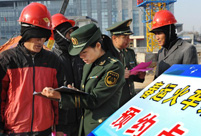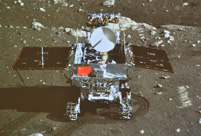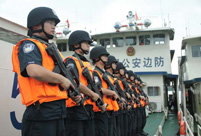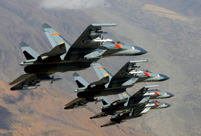 'Jin' named the word of the year by cross-strait netizens
'Jin' named the word of the year by cross-strait netizens Chinese scientific expedition goes to build new Antarctica station
Chinese scientific expedition goes to build new Antarctica station
 Chinese naval escort fleet conducts replenishment in Indian Ocean
Chinese naval escort fleet conducts replenishment in Indian Ocean 17th joint patrol of Mekong River to start
17th joint patrol of Mekong River to start China's moon rover, lander photograph each other
China's moon rover, lander photograph each other Teaming up against polluters
Teaming up against polluters
The United States stressed again its rebalancing strategy towards the Asia-Pacific region due to the recent events in the region.
On the one hand, Sino-US economic ties retain strong momentum. At the 24th Session of the China-U.S. Joint Commission on Commerce and Trade (JCCT) held from Dec. 19 to Dec. 20 in Beijing, both sides showed their common will to strengthen cooperation in economy, trade and investment.,
On the other hand, U.S. suspicion of China is on the rise. Recently, a Chinese warship had an “encounter” with a U.S. vessel in the South China Sea, and U.S. Secretary of State John Kerry made remarks on the Air Defense Identification Zone over the East China Sea during his visit to Vietnam and the Philippines. Both events caused tremors in Sino-U.S. relations.
Increasing proximity in economy and trade, mutual suspicion in politics, occasional military friction; these are the features of the competitive and interdependent Sino-U.S. ties.
However, with the spread of areas involving bilateral relations, the Sino-US balance of power has shifted. As a result, the U.S. is becoming concerned about its dominant position in the world.
Historically, the development of Sino-US relations has been subject to constant change. Affected by the dissolution of the Soviet Union in the early 1990s, China-U.S. ties were at their lowest ebb. During this period, the U.S. imposed sanctions against China in five areas and the 1996 Taiwan Strait Crisis caused the largest naval movement by the U.S. in the Asia-Pacific since the Vietnam War.
But it was also during this time that the U.S. gradually accepted China’s status as a defender and reformer of international system, which paved the way for more constructive development of Sino-U.S. relations during the first decade of this century.
In recent years, with the rising strength of China, the U.S. has returned to the deployment and implementation of its Asia-Pacific strategy, which regards China as a potential challenger to U.S. hegemony in the world.
The U.S. overreacts to China’s defense of its sovereignty, which results in strategic misjudgment. Both sides should make more effort to solve such problems through the construction of a new type of Sino-U.S. relations.
At the same time, The United States needs to maintain its strategic flexibility because there is no rationale to confront or constrain China. China’s strategy of peaceful development has been understood both by its neighbors as well as the U.S. Currently, China and the U.S. share many common interests and their interdependence calls for bilateral ties: both will gain from cooperation, both will lose from conflict.
During the process of Sino-US strategic revaluation and adjustment, how to develop a new type of bilateral relations in the context of China's growing strength is the key to developing stable and mature Sino-U.S. ties. It has also great significance for international relationships and security.
 People prepare for upcoming 'Chunyun'
People prepare for upcoming 'Chunyun'  Highlights of Beijing int'l luxury show
Highlights of Beijing int'l luxury show Record of Chinese expressions in 2013
Record of Chinese expressions in 2013 China's moon rover, lander photograph each other
China's moon rover, lander photograph each other 17th joint patrol of Mekong River to start
17th joint patrol of Mekong River to start Spring City Kunming witnesses snowfall
Spring City Kunming witnesses snowfall Heritage of Jinghu, arts of strings
Heritage of Jinghu, arts of strings Weekly Sports Photos
Weekly Sports Photos PLA elite units unveiled
PLA elite units unveiled  China's stealth fighters hold drill over plateau
China's stealth fighters hold drill over plateau Chinese navy hospital ship's mission
Chinese navy hospital ship's mission  "Free lunch" program initiated in NW China
"Free lunch" program initiated in NW China  Rime scenery in Mount Huangshan
Rime scenery in Mount Huangshan DPRK's Kaesong Industrial Complex
DPRK's Kaesong Industrial Complex 'Jin' named the word of the year
'Jin' named the word of the year Day|Week|Month